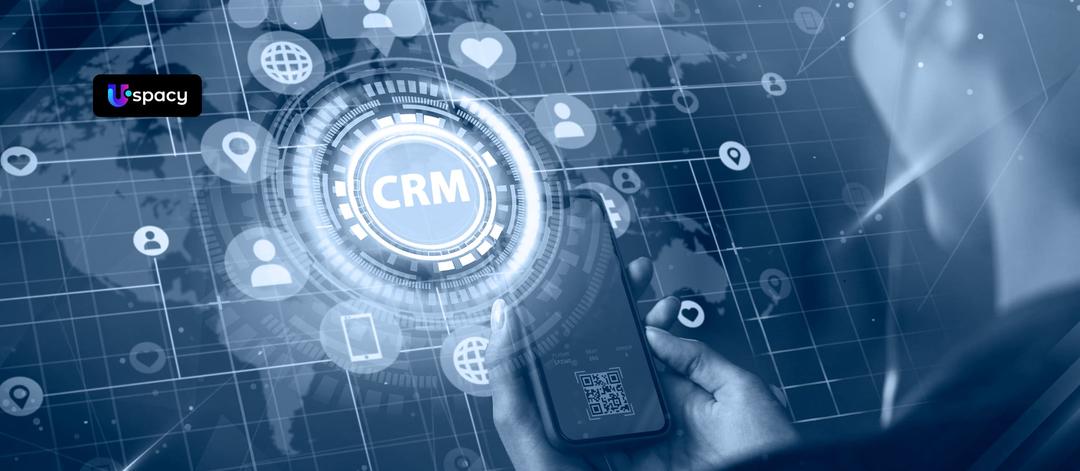How to choose a CRM for your business
October 6, 2025
5-minute read
Dmytro Suslov

A CRM either becomes the nervous system of the business or turns into just another “table with fields.” Uspacy provides a single Space for sales, tasks, communications, and analytics so the company truly manages processes instead of patching chaos.
Business faces an urgent need to effectively manage client relationships. This is precisely what has turned CRM systems into a necessity for companies of any size. By implementing automation, these systems structure business processes, eliminate routine tasks, and increase sales volumes.
The market offers a wide range of CRM solutions — from free basic versions to complex enterprise platforms. Let’s explore how to choose the optimal solution for your needs.
The importance of choosing the right CRM for your business
CRM implementation has a major impact on all aspects of client interaction, bringing together sales, marketing, and support teams. Making the wrong choice can lead to wasted resources and missed business opportunities.
Typical mistakes in choosing a CRM
One of the most common mistakes is choosing a CRM based solely on price. A low-cost system with limited capabilities can soon become an obstacle to business growth. On the other hand, opting for a feature-heavy CRM doesn’t guarantee better results—if the interface is too complex, your team likely won’t use it effectively. Another misstep is choosing a CRM without aligning it to your business model; for instance, what works for retail may not suit B2B sales.
Risks of choosing the wrong CRM
An incorrectly chosen CRM system poses serious risks:
- loss of investments in software and staff training;
- increased time spent on routine tasks;
- resistance from employees who find the CRM implementation inconvenient;
- failure to achieve the expected sales growth.
Companies frequently fail due to choosing the wrong system.
Criteria for choosing a CRM for business
When choosing a CRM, it is important to consider a range of key factors that determine the system’s effectiveness for a specific company.
Business scale and industry
The size of the company directly influences the choice of CRM system. Small businesses need automation, while medium-sized businesses require more advanced options for automation and analytics.
Industry specifics are also important:
- E-commerce and retail require integration with websites, delivery and payment systems, as well as omnichannel client support;
- B2B companies need support for long sales cycles, product catalogs, and automation;
- Medical institutions require resource booking capabilities (doctors and rooms) and integration with medical information systems;
- Construction companies focus on project and supplier management;
- Service sector needs resource reservation and quality control of service.
CRM functionality
Basic features that every CRM system should have:
- Client management: Contacts, companies, detailed profiles with interaction history, and segmentation by various criteria.
- Sales funnels: Managing deals by stages with the ability to create multiple funnels for different business areas.
- Omnichannel communications: Integration with messengers (Telegram, Viber, WhatsApp), IP telephony, and email in a single interface.
- Task management: Planning, progress tracking, reminders, checklists, and delegation.
- Process automation: Triggers, conditional actions, automatic deal stage transitions.
- Mobile access: Fully functional mobile apps for iOS and Android.
- E-commerce integrations: Connecting marketplaces, online stores, delivery systems, and payment services.
- Analytics and reports: Dashboards, KPIs, funnel analysis, and manager performance evaluation.
- Document generator: Creating contracts, invoices, and commercial proposals based on CRM data.
- Permissions: Flexible role and restriction settings for different employees.
- Data import/export: Migration from other systems and exporting reports.
- Custom fields: Ability to add custom fields and customize profiles to fit business processes.
Additional features may include AI assistants and smart automation, no-code platforms for creating custom solutions, predictive analytics, and omnichannel client support.
Ease of use and integration
A user-friendly interface is one of the most important criteria when choosing a CRM. Companies using simple, easy-to-navigate systems tend to see higher employee adoption rates. A modern CRM should easily integrate with other tools such as email, messengers (Telegram, Viber, WhatsApp, Instagram), IP telephony, marketplaces (Rozetka, Prom, Amazon), delivery services, payment systems, and accounting software.
Analytics and cost
Powerful analytics capabilities transform a CRM into a strategic decision-making tool. The cost of the system includes not only the license fee but also expenses for implementation, training, and support. The optimal solution is a CRM with a subscription model based on the actual number of users.
Localization and support
A CRM should offer a multilingual interface, localized formats (dates, numbers, currencies), support for regional document workflow processes, integrations with local services, and compliance with data protection laws (such as GDPR).
Technical support — a critical factor, especially for small and medium-sized businesses. Evaluate the availability of support (chat, phone, email), response speed, and the knowledge base with documentation.
Ease of implementation
Ease of implementation includes:
- convenient data migration from previous systems;
- availability of ready-made templates for different industries;
- the possibility of phased rollout without interrupting workflows.
A network of integration partners ensures professional system customization to the specifics of your business. It is important that certified partners are available in your region to assist with implementation, team training, and ongoing system support.
Comparison of popular CRM systems
The CRM market features dozens of providers catering to different business segments.
Let’s look at the most popular solutions and their key features:
- Salesforce — a powerful enterprise system but overly complex for small businesses. Pricing starts at $25 per user per month, plus expensive additional modules.
- HubSpot — a popular platform with marketing tools. The free version is very limited, and useful features start at $20 per month.
- Pipedrive — convenient for sales funnels but has a basic feature set and requires additional integrations. Pricing starts at $14.90 per user per month.
- Zoho CRM — a functional system with an AI assistant for those not deterred by a complex interface and predominantly English language. Pricing starts at €14 per user per month.
- Odoo CRM — a flexible open-source platform that requires technical knowledge or costly hiring of developers.
- Uspacy — a local product with a global approach but focused on the Ukrainian market. Its key feature is that it’s not just a CRM but a full set of business tools. It provides complete integration with local services and works as a single tool for communication, task management, analytics, and marketing. There is a free plan to start with.
- KeyCRM — a Ukrainian CRM for e-commerce with good marketplace integrations, mainly targeting online retail, so it has a limited feature set for other industries.
- KeepinCRM — a domestic system with a free version for 1 user; scaling for teams requires moving to paid plans with limited features.
- SalesDrive — a Ukrainian CRM focused on B2B sales, but it has a narrow specialization and is less suitable for comprehensive business automation.
- SendPulse CRM — an additional tool from an email marketing service with marketing features, but it falls short of full-fledged CRM systems in terms of functionality.
How to determine which CRM is best for you
Choosing the optimal CRM requires a systematic approach and analysis of current business processes. Below are steps to help identify the most suitable system.
Conduct a business process audit
Before searching for a CRM system, determine which processes need automation. Key questions include:
- How does the sales process work?
- What stages does the client go through from the first contact to purchase?
- Where are the obstacles and which metrics are important to track?
Testing and team participation
Most CRM systems offer a free trial period, and some provide freemium versions with a basic set of features without time limits. During testing, create a real client database, set up the sales funnel, and check integrations. Involve employees in the selection process — this increases the chances of successful CRM implementation.
Benefits of choosing Uspacy CRM
Among many alternatives, Uspacy is a strong candidate for small and medium-sized businesses. The platform combines a wide range of tools with a user-friendly interface and a transparent pricing model.
Features and advantages of Uspacy
Uspacy CRM is designed for small and medium-sized businesses that need an effective tool without unnecessary complexity. The system offers a unified digital workspace, combining communication and CRM, an open API, and compliance with GDPR.
Compared to competitors, Uspacy has important advantages:
- a unified set of tools — CRM, tasks, communication, and analytics in one platform;
- full multilingual localization, integration with local services;
- user-friendly interface;
- affordable cost.
According to client feedback, implementing Uspacy helps to structure workflows and improve internal communication.
Conclusion
Choosing a CRM system is a strategically important decision that affects the efficiency of client management. The right system becomes an investment that pays off through increased sales and optimized business processes.
Before choosing a CRM, consider the specifics of your business, existing processes, and the real needs of your team. For entrepreneurs, Uspacy CRM offers an optimal balance between functionality, ease of use, and cost. Investing in a quality CRM system today is the foundation for stable business growth tomorrow.
Updated: October 6, 2025

